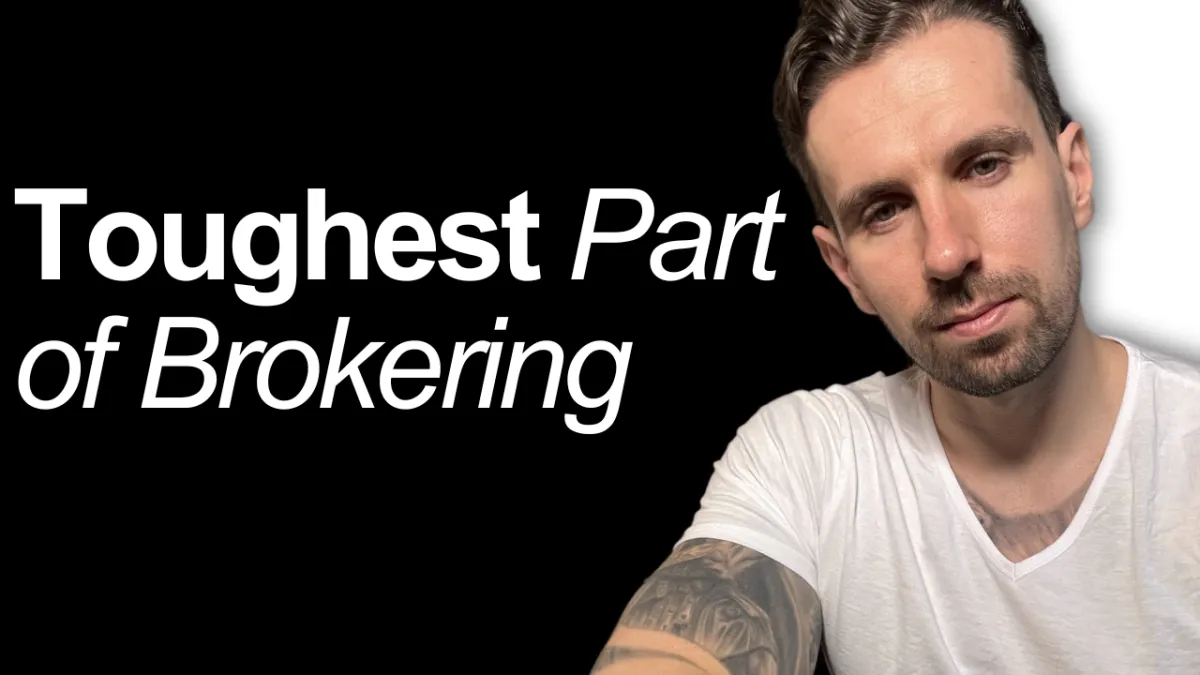Check out my YouTube channel for even more content HERE

What is the MOST Challenging Part of Being a Mortgage Broker?
When I first stepped into the world of mortgages, I assumed the toughest part would be mastering the products or keeping up with changing lender criteria. I was wrong.
The biggest challenge I faced—and the one I hear about from brokers time and again—isn't about knowledge. It’s about cash flow.
More specifically, it's about the unpredictable nature of income when you’re a self-employed mortgage broker.
In this article, I want to break that down and share the lessons I’ve learned helping hundreds of mortgage brokers navigate this industry. Whether you’re newly qualified, in your first year, or a few years in, managing cash flow in a commission-based business is one of the most important skills you’ll ever develop.
What Makes Income Irregularity So Hard for Mortgage Brokers?
As a mortgage broker, your income often depends on case completions—and those completions can be delayed by weeks or even months.
You might have an incredible month in terms of written business, but if nothing completes for 12 weeks, that can create serious financial pressure. And this isn’t something that’s talked about enough in the industry.
The video How Does Commission Work for Mortgage Brokers? breaks down the difference between procuration fees, broker fees, and the time delay between writing and getting paid. It's something every new broker should understand before stepping into self-employment.
You’re not just managing deals—you’re managing time and expectation. And that’s the part that can quietly break even the most capable brokers.
What Happens if You Don’t Plan for Delayed Income in Mortgages?
The reality is, if you don’t prepare for this income gap, it can impact every part of your business.
You may find yourself taking on the wrong clients, chasing poor-quality leads, or undercharging just to keep cash moving. This leads to burnout, poor client experience, and a cycle of stress that’s hard to break.
In What to Expect in Your First Year as a Mortgage Broker, I talk about the steep learning curve in those early days. It’s not just about product knowledge—it’s about emotional resilience, financial discipline, and knowing how to ride out the slow months without panicking.
This is also covered in my blog: What Do You Need to Have a Successful Mortgage Broker Business?. Spoiler: it’s not just about qualifications.
How Do You Start Thinking Like a Mortgage Business Owner?
This is where the shift happens. If you want longevity in the mortgage industry, you need to stop thinking like an adviser and start thinking like a business owner.
When you’re self-employed, you’re responsible not just for giving advice, but for generating leads, managing your time, doing your marketing, and forecasting income. You're running a full business operation.
The video Can You Become a Self-Employed Mortgage Broker? gives a great overview of what this really involves. From marketing to compliance, from pipeline management to mindset—it’s all on you.
My blog on Is Mortgage Broking Recession-Proof? also speaks to this point. The brokers who make it long term are the ones who think beyond today’s commission and build systems that support long-term stability.
Why Is Building a Financial Buffer Essential in the Mortgage Industry?
One of the most practical things I’ve learned—and something I coach all brokers on—is the importance of creating a financial buffer.
Whether that’s three months of living expenses saved, or simply a more realistic expectation of how income will flow in, having that cushion changes everything. It gives you space to make smart decisions, to market properly, and to be selective about the clients you work with.
A great resource to explore this further is my article How Much Can You Earn as a Mortgage Broker in the UK?. It walks through expected earnings at different stages of your career and how long it might take to reach a consistent income.
How Do You Stay in Control When Running a Mortgage Business?
Without structure, the mortgage business can feel overwhelming.
Early in my career, I noticed that I felt most in control when I had a defined routine. Daily planning, clear systems, and even small automations like diary management and email follow-ups can make a big difference.
If you feel like you’re constantly firefighting, take a look at The Must-Have Tools Every Mortgage Broker Should Be Using. In that video, I share the exact tools I use and recommend to brokers to manage their pipeline, time, and marketing more efficiently.
You might also want to read my blog on The Role of Technology in Modern Mortgage Broking, which shows how small tech tweaks can completely transform your day-to-day workflow.
How Can Mortgage Brokers Stay Calm During Uncertain Times?
This might sound intangible, but it’s probably the most important skill you’ll ever learn in mortgages: staying calm in the chaos.
When everything is moving at once—compliance, cases, clients, income—you have to anchor yourself. That might mean sticking to a daily routine, doing regular financial reviews, or having support from a coach or mentor.
In What to Do When Business Slows Down – A Guide for Mortgage Brokers, I cover how to stay motivated and resilient during tough seasons. Because let’s face it—mortgages is a cyclical industry. But calm, proactive brokers always bounce back faster.
What’s the Key Lesson for Career Growth in the Mortgage Industry?
If there’s one thing I’ve learned working with hundreds of brokers, it’s this:
Consistency beats intensity.
Yes, there are seasons where you’ll hustle. But long-term success in mortgages comes from steady habits: showing up, following up, tracking income, managing expenses, and nurturing relationships.
And more importantly—learning to play the long game. The brokers who do that not only survive… they thrive.
Final Thought
If you're feeling overwhelmed by the inconsistent income in your mortgage business, know that you're not alone. It's one of the most common challenges in our profession—and it's 100% solvable with the right mindset, structure, and support.
Build systems. Forecast realistically. Keep your pipeline full. And above all—stay calm and stay the course.
